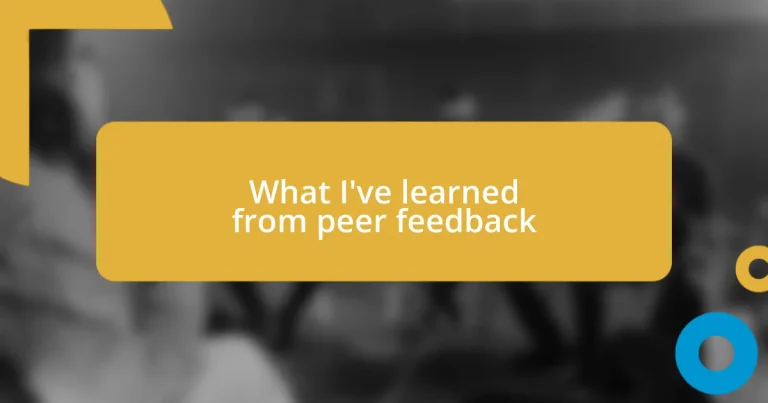Key takeaways:
- Peer feedback is most effective when it combines honesty with a balanced approach of praise and critique, fostering an environment of growth and understanding.
- Constructive feedback promotes accountability and a culture of continuous learning, encouraging individuals to reflect on their strengths and areas for improvement.
- Techniques for receiving feedback, such as active listening and asking clarifying questions, are essential for transforming feedback into constructive dialogue and personal growth opportunities.
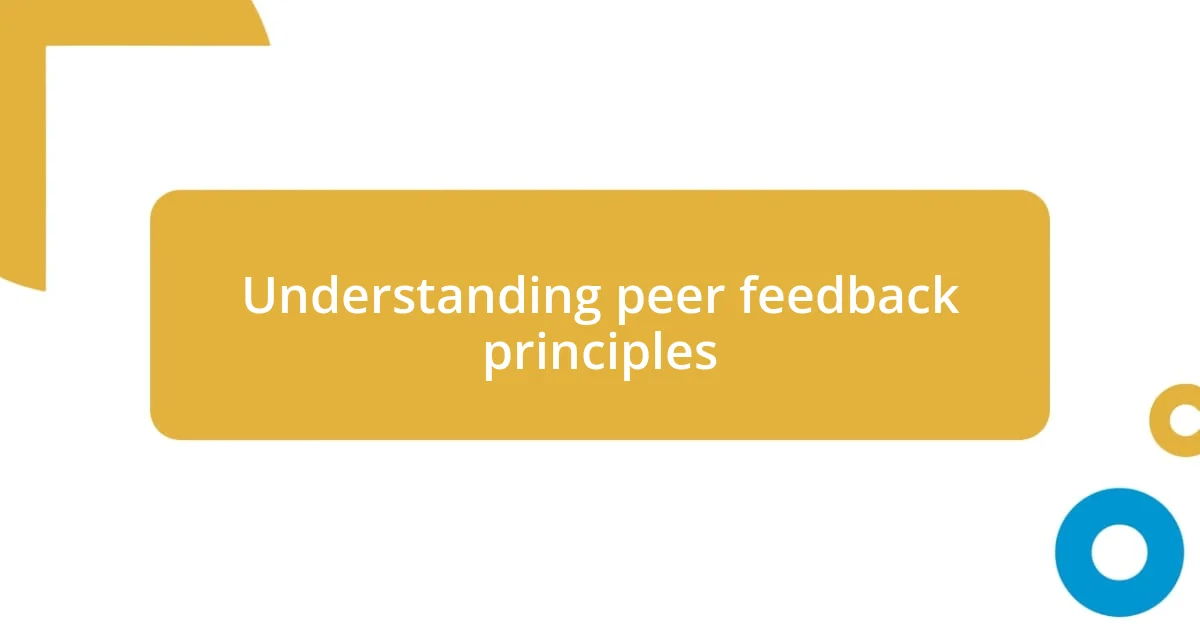
Understanding peer feedback principles
Peer feedback operates on a few fundamental principles that can truly transform our understanding and implementation of it. For instance, I remember a time when I received feedback from a colleague that, at first, felt like an attack on my work. However, I soon realized it was a gift wrapped in honesty, aimed at pushing me toward growth. Isn’t it fascinating how a simple change in perspective can turn criticism into constructive insights?
Another principle revolves around the balance between praise and critique. I’ve noticed that when I offer a compliment alongside a suggestion for improvement, my peers are more receptive. I often ask myself, “How would I want to hear this?” This self-reflection helps me frame my feedback in a way that’s more encouraging, creating a supportive environment where everyone feels valued.
Finally, the principle of specificity cannot be overstated. Aimlessly stating that something is “good” or “bad” lacks substance and can lead to confusion. Once, I received feedback that highlighted not just what wasn’t working, but also pointed out exactly why it fell short. That clarity ignited a change in my approach—don’t you think it empowers the receiver to take action when they truly understand the ‘why’ behind the feedback?
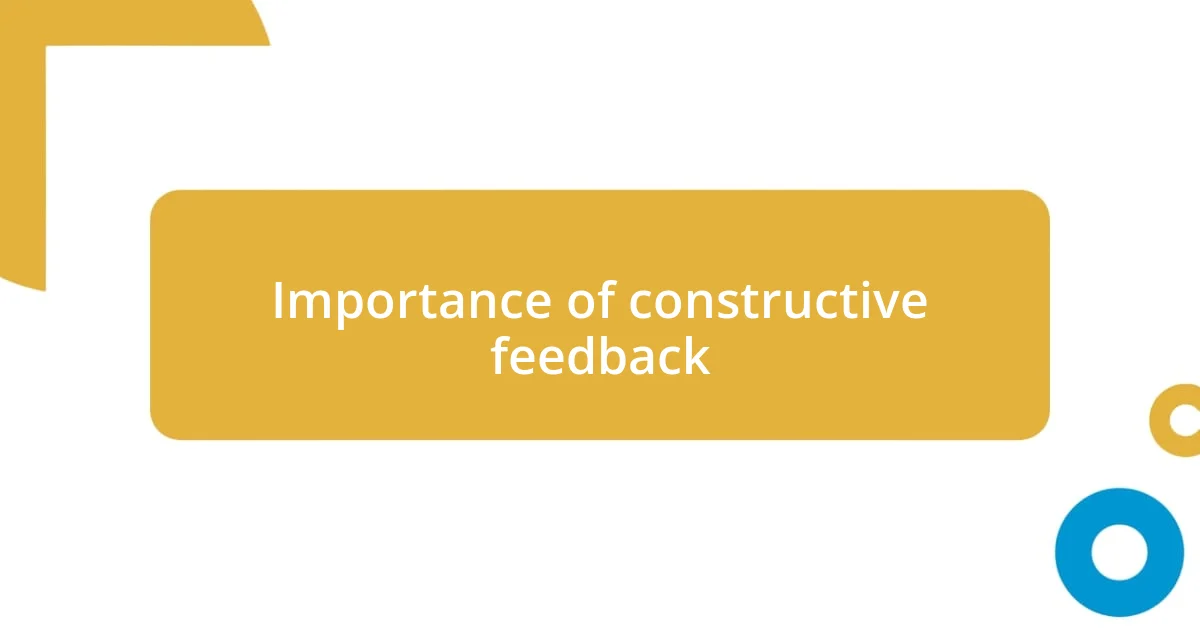
Importance of constructive feedback
The power of constructive feedback cannot be underestimated. There have been moments when feedback offered by peers sparked genuine breakthroughs in my work. For instance, after presenting a project, a colleague pointed out a specific area where I could improve my argument. Initially, I felt defensive, but their clear reasoning helped me refine my ideas, enhancing the overall effectiveness of my presentation.
Another crucial aspect of constructive feedback is its role in fostering a culture of continuous learning. I vividly recall a group project where we regularly exchanged feedback. It wasn’t just about pointing out shortcomings but also acknowledging strengths. Each session made me appreciate my teammates more and motivated me to push my boundaries. That kind of environment breeds creativity and collaboration, wouldn’t you agree?
Additionally, constructive feedback encourages accountability. When I receive direct, actionable insights, I feel a sense of responsibility to apply those suggestions. There was a time when a mentor pointed out how my communication style could be more inclusive. This motivated me to actively work on it, leading to more engaging discussions within my team. This process serves as a reminder that feedback isn’t personal; it’s a catalyst for improvement.
| Aspect | Impact of Constructive Feedback |
|---|---|
| Encourages Growth | Transformative insights push individuals towards personal and professional development. |
| Fosters Collaboration | Creating an environment where feedback is shared builds trust and boosts teamwork. |
| Enhances Accountability | Specific feedback drives individuals to take responsibility for improvements in their work. |
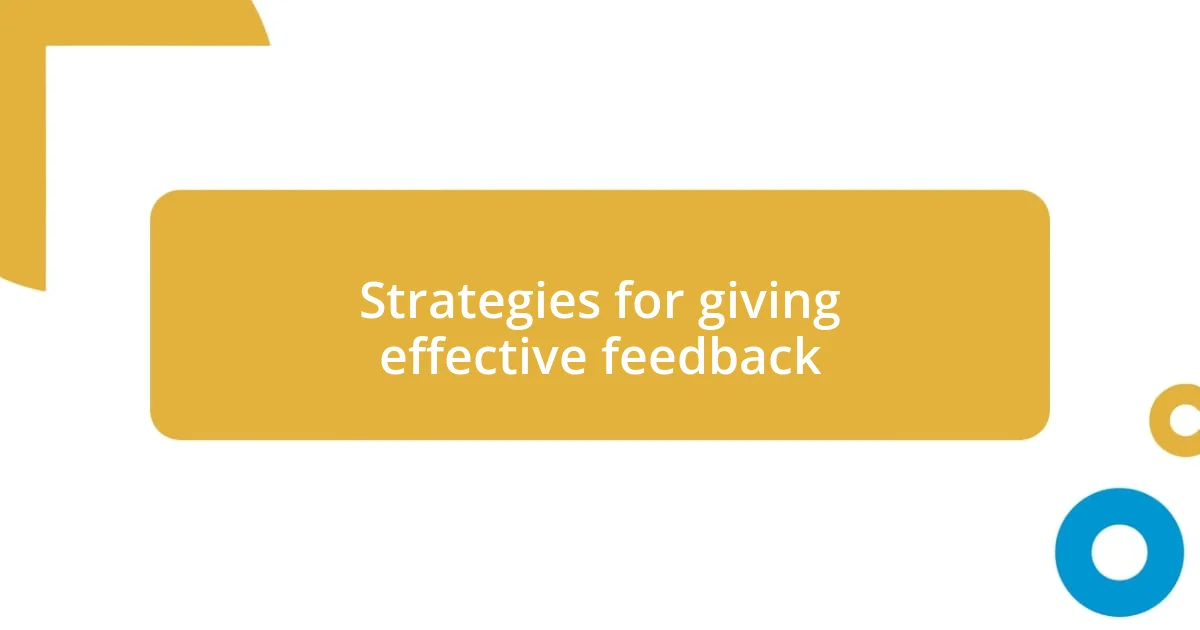
Strategies for giving effective feedback
Feedback can be a delicate dance, but with the right strategies, it can lead to meaningful outcomes. One approach that I’ve found beneficial is to frame my feedback with a focus on the person’s goals. When I tailor my comments to align with what they are aiming to achieve, it feels less like an imposition and more like a supportive nudge towards success. I distinctly remember chatting with a fellow team member who wanted to refine her presentation skills. I focused my feedback on her objective and offered strategies that would resonate, and the relief on her face was palpable.
To enhance the effectiveness of feedback, consider these strategies:
- Be Person-Centered: Tailor your feedback to individuals, connecting it to their aspirations.
- Use ‘I’ Statements: Share your perspective without placing blame, which keeps the conversation constructive.
- Prioritize Two-Way Dialogue: Encourage questions and discussions, allowing the recipient to express their thoughts.
- Set Clear Expectations: Make it evident what aspects you’re critiquing and why, providing context that can transform the feedback into actionable insights.
This simple yet profound shift toward respecting individual objectives not only fosters trust but also creates an atmosphere that encourages growth. It’s that emotional connection, I believe, that truly powers productive conversations.
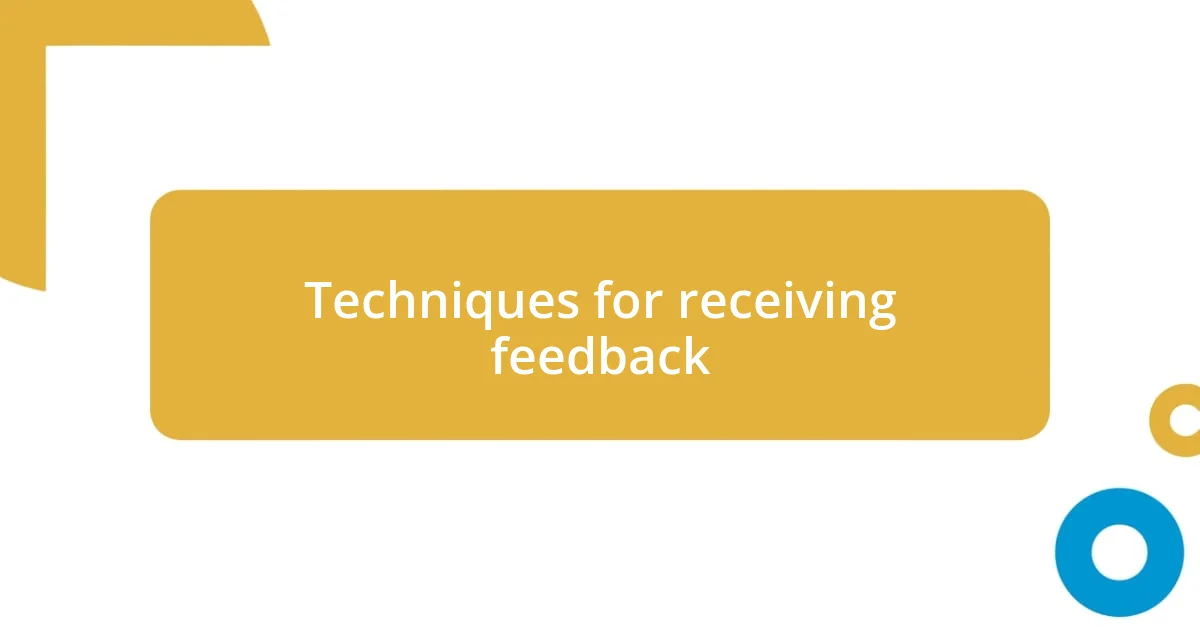
Techniques for receiving feedback
Receiving feedback can be a vulnerable experience, but there are techniques that can help transform it into a constructive dialogue. One method I’ve found useful is practicing active listening. When someone shares their insights, I make a conscious effort to look them in the eye and absorb their words without interrupting. I’ve noticed that this not only helps me understand their perspective better but also makes the other person feel valued. Have you ever felt unheard in a conversation? That’s what makes active listening so critical; it fosters an atmosphere of respect and openness.
Another effective technique is to ask clarifying questions when feedback feels unclear or overwhelming. For example, after receiving feedback on a recent project, I found myself puzzled about a certain critique. Instead of letting it frustrate me, I took a deep breath and asked my colleague to elaborate on their point. This approach not only cleared my confusion but also led to a deeper discussion about areas I hadn’t considered. Isn’t it interesting how a simple question can unlock new insights and pathways for growth?
Finally, I encourage a mindset of gratitude towards feedback, even when it feels harsh. A few years ago, I received some difficult criticism about a report I submitted. My initial reaction was anger, but I decided to pause and reflect. Eventually, I recognized that this feedback was a goldmine of learning opportunities. Adopting this perspective allowed me to improve my work significantly. How might your work change if you viewed feedback as an opportunity rather than a setback? This shift in thinking can be truly transformative.
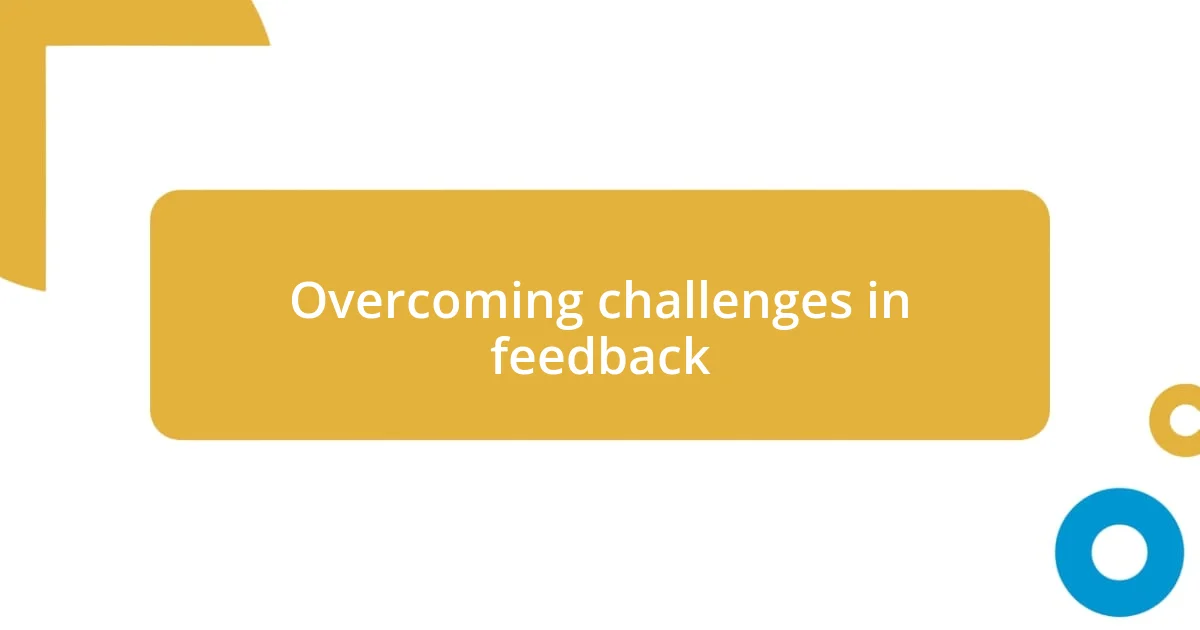
Overcoming challenges in feedback
Navigating the challenges of giving and receiving feedback can sometimes feel like walking on a tightrope. I recall a moment when I delivered feedback to a colleague with enthusiasm, only to be met with defensiveness. In that instant, I realized that my good intentions didn’t always translate well. This experience taught me the importance of being mindful of the recipient’s emotional state. If I recognized that they were feeling vulnerable or insecure, it’s much easier to meet them where they are. Isn’t it fascinating how a little empathy can shift the entire tone of an interaction?
Then there’s the fear of sounding overly critical. I’ve struggled with striking the right balance between honesty and encouragement. I remember a time when I hesitated to point out areas for improvement, thinking it might hurt my friend’s feelings. Ultimately, I chose to be honest, but I paired my critique with specific ways to enhance their work. The look of gratitude in their eyes reminded me that, though uncomfortable, these conversations could lead to growth. How often do we miss the chance to foster improvement because we shy away from honest dialogue?
On the receiving end, overcoming challenges can be equally daunting. I’ve sat in meetings where feedback felt like an avalanche of criticism. Instead of shutting down, I learned to take mental notes and ask for elaboration later on the specific points that struck me. It’s astounding how empowering it feels to reclaim control over my learning process in those moments. Have you ever realized that by engaging in a conversation instead of retreating, you could completely alter your perspective? Embracing that interaction turned what could have been a disappointing experience into a profound learning opportunity, making the feedback feel like a stepping stone rather than a stumbling block.
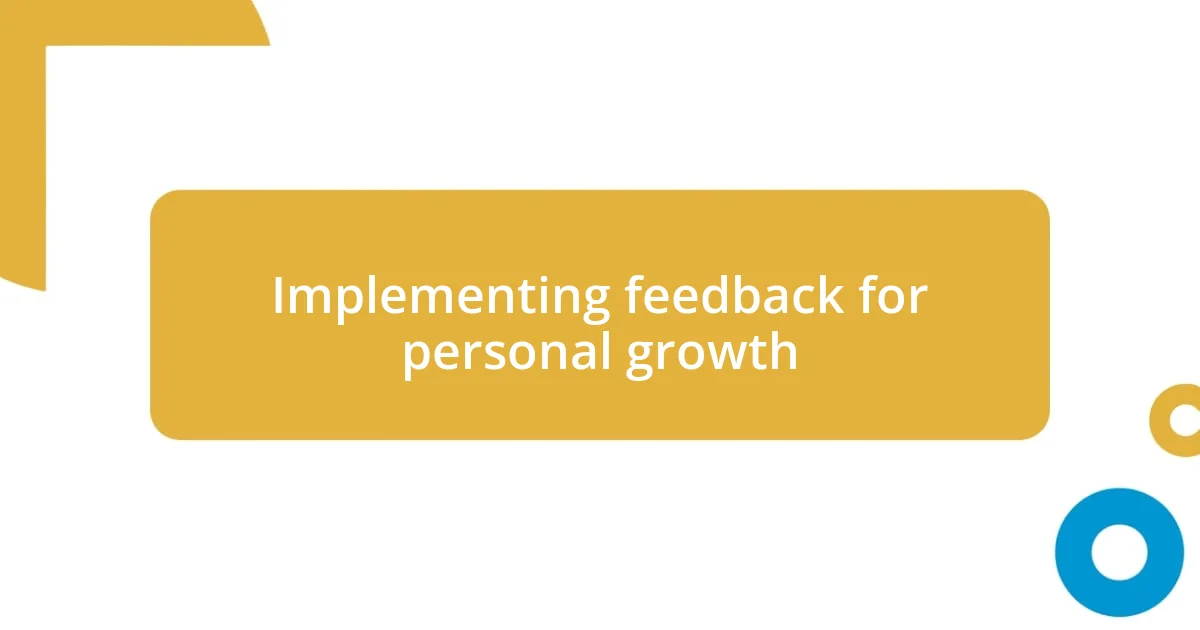
Implementing feedback for personal growth
Implementing feedback effectively can spark significant personal growth, as I’ve experienced time and again. I remember a time when I received feedback about my presentation skills that caught me off guard. Initially, I felt a mix of embarrassment and defensiveness, but then I took a step back and recognized an opportunity. By revisiting my notes and practicing the suggested techniques, I saw not only an improvement in my abilities but also a boost in my confidence. How often do we overlook these moments because fear clouds our judgment?
In another instance, after receiving feedback on a team project, I dug deeper into the comments expressed by my peers. Rather than taking them at face value, I reached out and had detailed discussions about their observations. Through this dialogue, I gained insights that reshaped my approach to collaboration and significantly enhanced our team’s dynamic. Does it surprise you how a few open-ended conversations can lead to transformative insights that propel not just individual growth but collective success?
What stands out to me the most is how feedback, when embraced, can become a powerful tool for continuous improvement. A few months ago, I received constructive criticism on my writing style. While it stung at first, it pushed me to refine my tone and engage with my audience more effectively. I began experimenting with different writing techniques, and the result was invigorating: my readers connected with my work on a deeper level. Have you ever wondered how embracing even the toughest feedback can unlock a new version of yourself? By implementing feedback with a proactive mindset, I truly believe we can harness our potential and accelerate our personal journeys.
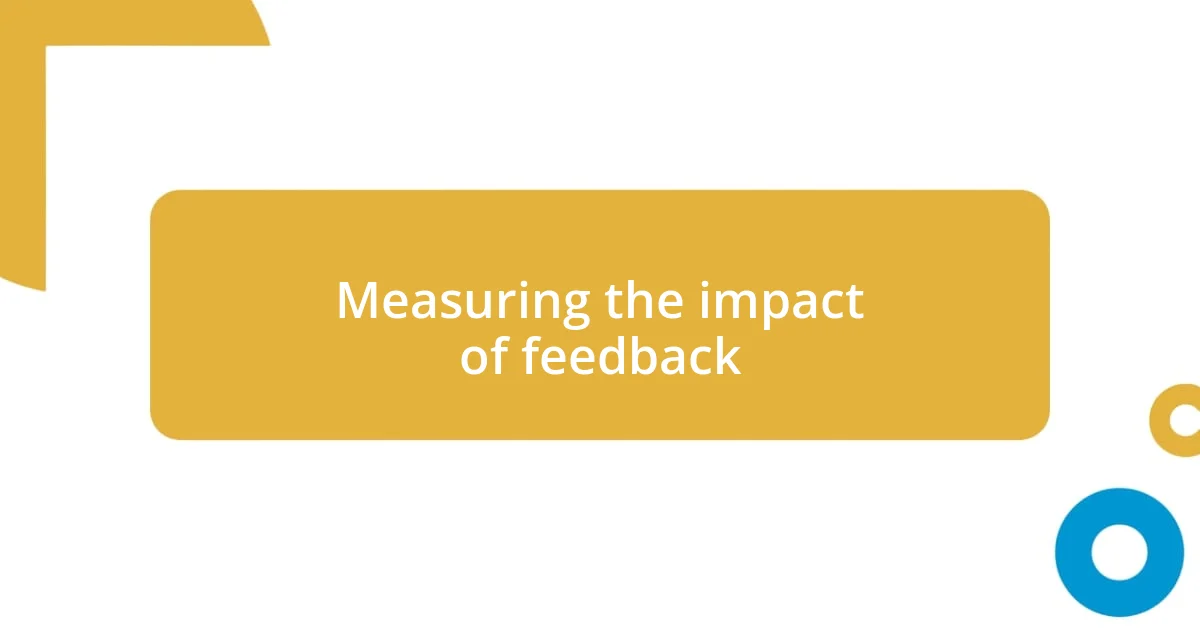
Measuring the impact of feedback
Measuring the impact of feedback is crucial to understanding its effectiveness. I recall a project where I utilized peer evaluations to assess our team’s performance. Initially, I was apprehensive, fearing mixed responses. However, by analyzing the feedback trends, I could pinpoint specific areas where we thrived and where we struggled, turning metrics into meaningful insights. Isn’t it fascinating how data can transform abstract feelings into concrete growth strategies?
I’ve learned that qualitative feedback can be just as enlightening as quantitative data. During a workshop I conducted, I encouraged participants to share their thoughts anonymously. The themes that emerged were surprising; individual comments illuminated strengths in my presentation style that I hadn’t recognized. The positive vibes I felt were immeasurable, but more importantly, they informed my future interactions. Have you ever noticed how small affirmations can reinforce your approach, shaping your confidence in immeasurable ways?
Tracking feedback over time offers a unique window into personal development. A couple of years ago, I realized my writing was stagnating. By consistently seeking feedback and measuring my progress, I identified a pattern: the more open I was to criticism, the more I evolved. After implementing suggestions on clarity and engagement in my writing, I began to notice an increase in reader interactions. Isn’t it incredible how data, feelings, and personal stories weave together to create a narrative of growth? By regularly measuring the impact of feedback, I discovered not just improvement, but a deeper connection to my craft.












